Assembled here are key sources that have shaped the modern Middle East, Zionism and Israel. We have included items that give texture, perspective and opinion to historical context. Many of these sources are mentioned in the Era summaries and contain explanatory introductions.

The United States endorses the application of U.N. Security Council Resolution 242 to the West Bank and Gaza, seeks Palestinian control over land and resources, and wants the territories to be affiliated with Jordan.
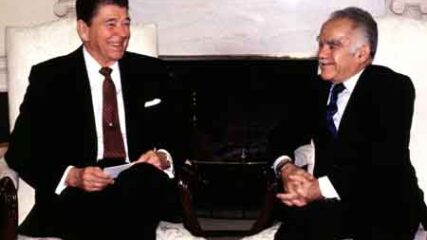
Areas of bilateral political and military cooperation are noted to fend off Soviet involvement in the Middle East, to assist Israel in building the Lavi aircraft, to support an independent Lebanon and to promote Arab-Israeli negotiations.
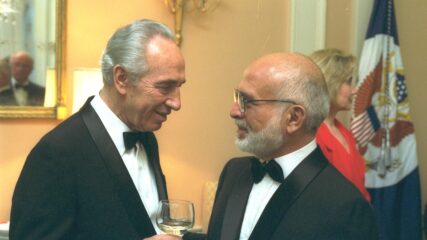
The Jordanian king and Israeli Labor Party leaders secretly outline a plan to convene an international conference to move Israeli-Palestinian talks forward through a conference format, but Likud opposition leaders squash the idea.

Jordan’s King Hussein made a strategic decision to disassociate administratively from the West Bank, leaving it to focus Jordanian national identity on only the east bank of the Jordan River. The PLO subsequently negotiated with Israel to rule over some of these lands, as codified in the 1993 Oslo Accords, but no Palestinian state was promised.

Since its inception in 1988, Hamas has been crystal clear about its total opposition to Zionism and Israel. It opposes any kind of negotiations or agreements that recognize Israel as a reality, and its more extreme spokesmen regularly incite or celebrate the killing of Jews.
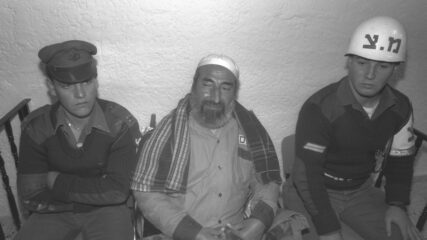
As a militant Islamic Palestinian national organization, Hamas believes that Israel is illegitimate and should be destroyed through Jihad. Hamas opposes all recognition and negotiation with Israel and opposes PLO/PA leaders who have negotiated and collaborated with Israel from time to time. The Hamas-PA competition severely fragments the Palestinian political community.

In the waning days of the Reagan administration, Secretary of State George Shultz pushes for U.S.-mediated peace negotiations, including Palestinians, and offers the outlines for a resolution to the conflict.

PLO Chairman Yasser Arafat issues a declaration with five American Jewish leaders in an effort to meet U.S. conditions for dialogue and thus strengthen his position as the leader of the Palestinian national movement.
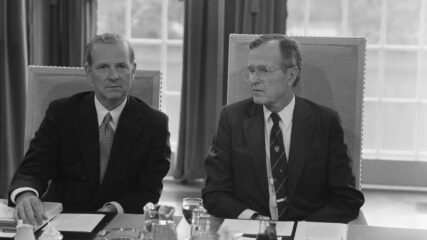
Secretary of State James A. Baker III brings a realistic and prescient vision of Arab-Israeli peace negotiations and U.S. mediation to AIPAC early in the George H.W. Bush presidency.

U.S. Secretary of State James Baker warns that the United States will not accept Saddam Hussein’s erasure of Kuwait a month earlier. Baker says intimidation and force will not be tolerated in the post-Cold War world.

As part of the preparations for the Madrid peace conference in October 1991, U.S. Secretary of State James Baker drafts a memorandum of agreement between the U.S. and Israel regarding the particulars of resuming the Arab-Israeli peace process. He opens by reiterating that the intention of the negotiations is to achieve a regional peace agreement based on U.N. Security Council Resolutions 242 and 338.

After the 1991 Gulf War, the US orchestrates a conference with Israel, multiple Arab states, and Palestinians participating; the conference leads to bilateral and multilateral negotiations.
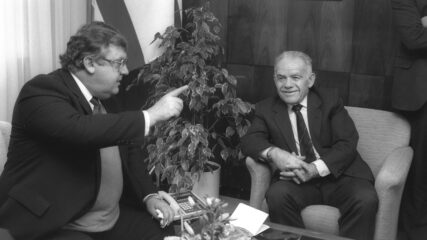
The U.N. General Assembly overwhelming reverses a Soviet-driven decision 16 years earlier to declare Zionism a form of racism.
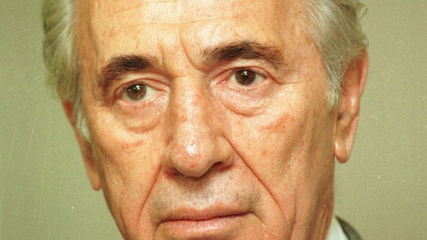
Foreign Minister Shimon Peres supports the Oslo Accords, opposes a Palestinian state and rejects Israel’s role in the Gaza Strip as the enforcer of security — all views that have continuing relevance for Gaza.














